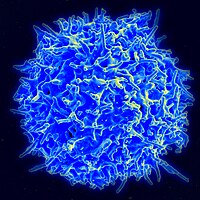
Photo from wikipedia
Peptide-based cancer vaccines offer production and safety advantages but have had limited clinical success due to their intrinsic instability, rapid clearance, and low cellular uptake. Nanoparticle-based delivery vehicles can improve… Click to show full abstract
Peptide-based cancer vaccines offer production and safety advantages but have had limited clinical success due to their intrinsic instability, rapid clearance, and low cellular uptake. Nanoparticle-based delivery vehicles can improve the in vivo stability and cellular uptake of peptide antigens. Here, a well-defined, self-assembling mannosylated polymer is developed for anti-cancer peptide antigen delivery. The amphiphilic polymer is prepared by RAFT polymerization, and the peptide antigens are conjugated to the pH-sensitive hydrophobic block through the reversible disulfide linkage for selective release after cell entry. The polymer-peptide conjugates self-assemble into sub-100 nm micelles at physiological pH and dissociate at endosomal pH. The mannosylated micellar corona increases the accumulation of vaccine cargoes in the draining inguinal lymph nodes and facilitates nanoparticle uptake by professional antigen presenting cells. In vivo studies demonstrate that the mannosylated micelle formulation improved dendritic cell activation and enhanced antigen-specific T cell responses, resulting in higher antitumor immunity in tumor-bearing mice compared to free peptide antigen. The mannosylated polymer is therefore a simple and promising platform for the delivery of peptide cancer vaccines. This article is protected by copyright. All rights reserved.
Journal Title: Advanced healthcare materials
Year Published: 2021
Link to full text (if available)
Share on Social Media: Sign Up to like & get
recommendations!